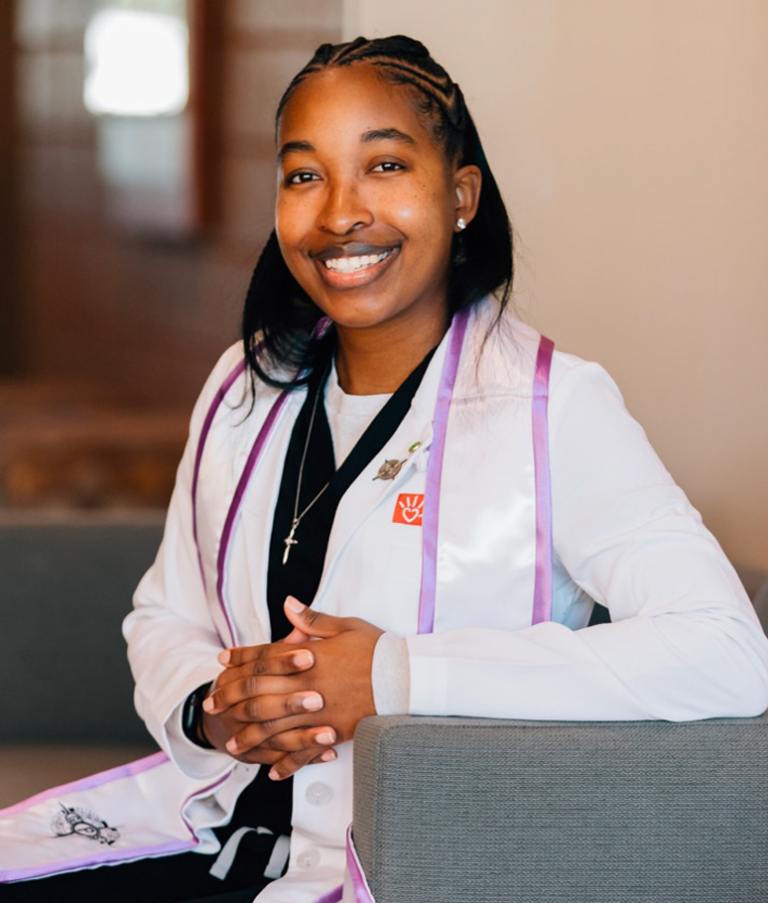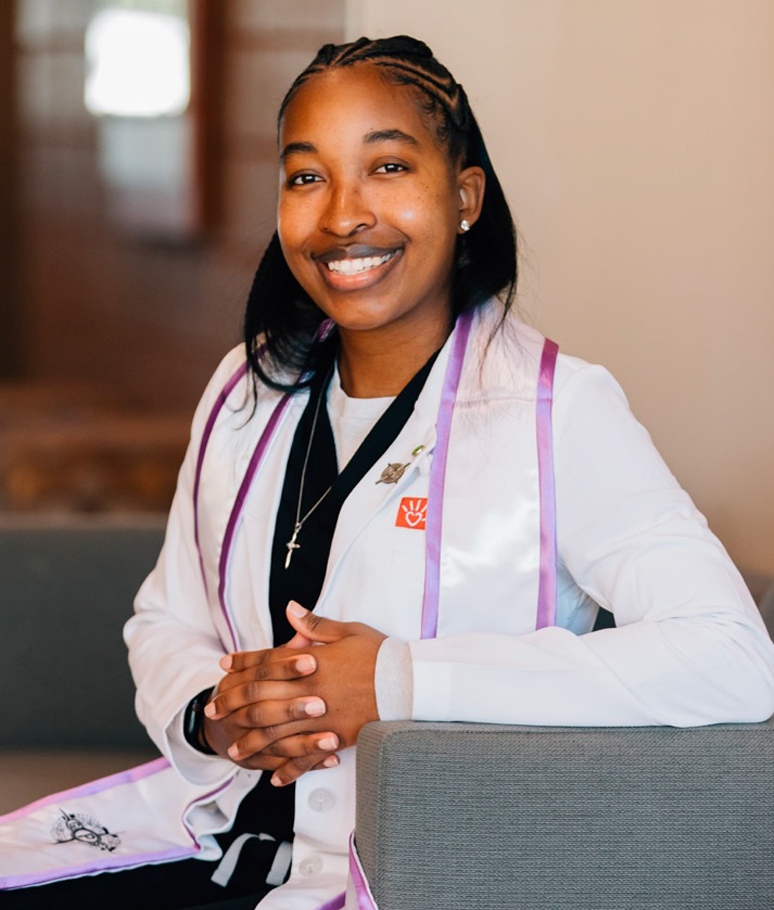ATSU-SOMA alumna Dr. Renée Crawford shares inspiration behind speech at MLK Day event
Posted: July 17, 2024
When Renée J. Crawford, DO, ’20, spoke at ATSU’s Championing the Legacy of Dr. Martin Luther King Jr. event on Jan. 16, she captivated the audience with her unique point of view, depth of knowledge, and passion for serving the underserved.
Dr. Crawford, a graduate of ATSU’s School of Osteopathic Medicine in Arizona (ATSU-SOMA), strives to be a clinically excellent, culturally proficient, and socially conscious physician. She hoped those tenets would shine through in her speech.
“I wanted to highlight Dr. King’s foundation and why he fought for what he fought for. I went to our founding documents, the Bill of Rights, the Constitution, and the Declaration of Independence,” Dr. Crawford says. “I went to Dr. King’s foundation, the Bible, and from a theological standpoint, the focus was to inspire us to be a good neighbor. So, in whatever role you play at ATSU, you need to look out for those you interact with.”
During her time at ATSU-SOMA, Dr. Crawford was recognized as a Graduate Health Professions scholar, awarded the 2019-20 ATSU Diversity Excellence Award for her work with ATSU Diversity & Inclusion and the Student National Medical Association, and named ATSU-SOMA 2020 Student DO of the Year.
Now, she is a chief resident at Phoenix Children’s Hospital Pediatric Residency Program Alliance. As a resident, she received the Phoenix Children’s J. Kipp Charlton, MD, Resident Humanitarian of the Year award for the 2022-23 academic year. In addition to support she’s received from ATSU-SOMA and Phoenix Children’s, she credits her success to the mentors she’s had throughout her healthcare journey.
A Southern California native, Dr. Crawford knew she wanted to be a doctor when she was just 5 years old. However, medicine wasn’t the only thing on her mind – she also had a passion for basketball. She attended Point Loma Nazarene University in San Diego on an athletic and academic scholarship. She majored in biology and was pre-med, and played point guard for the women’s basketball team, becoming team captain in her senior year.
In her gap year before attending ATSU-SOMA, Dr. Crawford was a substitute teacher and enjoyed teaching preschool, kindergarten, and second grade, solidifying her desire to be a pediatrician. She also was an assistant coach for Varsity girls’ basketball and head coach for freshman and Junior Varsity girls’ basketball.

When it came to her speech, Dr. Crawford not only focused on Dr. King, but she drew from her religious background as well as her love for sports and Disney movies. She opened with a quote from Dr. King’s speech at the annual meeting of the Medical Committee for Human Rights in 1966: “We are concerned about the constant use of federal funds to support this most notorious expression of segregation. Of all the forms of inequality, injustice in health is the most shocking and the most inhuman because it often results in physical death.”
She then took listeners on a journey through America’s healthcare system, highlighting how even through the passage of certain laws, including the Hill-Burton Act of 1946 and the Civil Rights Act of 1964, racist ideologies still crept into healthcare, contributing to health disparities and certain patients not getting the care they need.
“Our question for today is, if I don’t stop to help, what will happen to this community?” she asked the audience.
Dr. Crawford believes the best way for healthcare professionals to advance equality and justice in healthcare is simply by learning.
“We’re lifelong learners. Our goal should be to ensure our patients get access. We have to be socially conscious and aware of things affecting our patients,” she says. “When you take continuing education, you’re learning about new guidelines and clinical pathways and ensuring all your patients get access to care.”
At Phoenix Children’s, Dr. Crawford does just that and continues the work she did at ATSU-SOMA. As an intern, she joined the Diversity and Inclusion committee and Health Equity committee. She also is an integral part of the residency program’s Health Equity Advocacy Leaders (HEAL) curriculum. Through this program, all residents participate in the evidence-based Health Equity Pearl curriculum and HEAL rounds.
The Health Equity Pearl curriculum is a resident-designed, -led, and -sustained curriculum all residents present during the academic half-day conference. HEAL rounds are case reports of clinical cases seen in the program’s institution, which spark multidisciplinary discussion on how to pursue health equity for patients and their families. HEAL rounds are designed to extend beyond the residency program to inspire transformational change within the hospital system and achieve health equity for all patients and their families.
Through these programs, Dr. Crawford aims to foster an inclusive environment and give back to the community, further promoting Dr. King’s philosophy of being a good neighbor.
To listen to Dr. Crawford’s speech, visit atsu.edu/crawford-MLK
